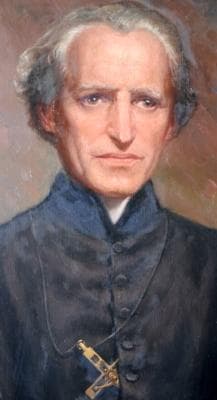
Blessed Basil Anthony Marie Moreau
Blessed
Feast Day: January 20
Birth: February 11, 1799
Death: January 20, 1873
Biography
Blessed Basil Anthony Marie Moreau, also known as Blessed Basil Moreau, was born on 11 February 1799 in Laigné-en-Belin, Sarthe, France. He was the ninth of fourteen children born into a poor but pious family during the tumultuous period of the French Revolution. His parents, who were deeply devoted to their faith, played an active role in the Catholic underground movement that sought to preserve the faith during the anti-religious revolution.
From a young age, Basil's parents instilled in him a strong Catholic faith, which would later shape his vocation. He received his early education from a local priest, who recognized his intellectual abilities and nurtured his spiritual development. At the age of 15, Basil entered the diocesan seminary in 1814. This seminary was run by the Sulpicians, a French society of priests known for their commitment to education and spirituality. Basil's time at the seminary greatly influenced his spiritual formation and set the foundation for his future ministry.
Ordained a priest on 12 October 1821, at the age of 22, in the Old Visitation Convent Chapel of the Sacred Heart in Le Mans, France, Basil dedicated himself to serving the people of God. However, the aftermath of the French Revolution had left a deep impact on the Church, with many priests and religious exiled or persecuted. Recognizing the need for a revival of Catholic life, Basil became a renowned preacher and catechist, traveling from town to town to teach and administer the sacraments.
In 1835, Basil was appointed as the assistant superior and theology professor at the seminary in Le Mans. This position allowed him to pass on his deep love for the Catholic faith to future generations of priests. During this time, Basil also began gathering like-minded priests who shared his vision of revitalizing the Church in post-Revolutionary France. This group, known as the Society of Auxiliary Priests, worked closely with another informal group called the Brothers of Saint Joseph.
The idea of forming a religious institute to further their mission took shape, and in 1837, the Society of Auxiliary Priests and the Brothers of Saint Joseph signed the Fundamental Pact of Union. This established the Congregation of Holy Cross, comprised of the two groups as equal societies within one community. The Congregation, inspired by the Holy Family, also gave rise to the Salvatorists, Josephites, and Marianites — societies of sisters who were intimately involved in the mission of the Congregation. Formal approval for these societies within the Congregation was granted in 1857.
Blessed Basil Moreau tirelessly dedicated himself to the work of the Congregation, fostering its growth and spreading the Gospel. His deep commitment to education led to the establishment of schools and colleges under the care of the Congregation, including the University of Notre Dame in Indiana, USA. Moreau's holistic approach to education, emphasizing character formation alongside intellectual development, remains a hallmark of Holy Cross educational institutions worldwide.
Blessed Basil Anthony Marie Moreau passed away on 20 January 1873 in Le Mans, Sarthe, France, at the age of 73. His legacy of faith, education, and the revitalization of the Church lives on through the Congregation of Holy Cross and the numerous institutions founded by them.
Recognizing his sanctity and extraordinary virtues, Pope John Paul II declared Moreau venerable on 12 April 2003. Later, on 15 September 2007, Pope Benedict XVI beatified him at Centre Antarès in Le Mans, France. The beatification miracle attributed to Moreau was the 1948 cure of a Canadian woman suffering from pleuritis of the left lung, formally acknowledged on 28 April 2006.
Blessed Basil Anthony Marie Moreau, a compassionate and visionary servant of God, continues to be revered as a model of holiness, education, and devotion to the Catholic Church. His beatification serves as an inspiration to all those who strive to follow Christ with unwavering faith.